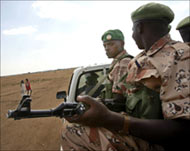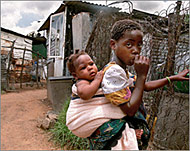Economist calls for more Africa aid
American economist Jeffrey Sachs has a novel way of tackling African poverty: shower more aid on the world’s poorest continent.

This may shock critics of African development who say aid has only made a bad situation worse.
Some analysts say aid has created a continent-wide sense of dependency and that vast amounts of donor funding has been wasted or stolen by inefficient and corrupt governments.
Africa is desperately poor despite being the recipient of tens of billions of dollars in aid over the past few decades.
The United Nations Development Programme (UNDP) says that sub-Saharan Africa’s per capita gross domestic product in 2002 was $469 compared to $22,987 for the affluent members of the Organisation for Economic Cooperation and Development (OECD).
But Sachs, in a Brookings Institution paper called Ending Africa’s Poverty Trap, maintains that only a huge infusion of carefully targeted public investment will pull Africa out of its grinding poverty.
Defying conventional wisdom, he asserts that previous aid flows to Africa have been far too small – or been squandered on dictators such as Mobutu Sese Seko of the former Zaire.
“… consider a large forest fire with a tendency to spread. Suppose that only one fireman is initially sent to fight the blaze, and he is overwhelmed,” writes Sachs.
“The critics might then say: ‘Why should we send more firemen? We’ve already seen that they are ineffective.'”
Millennium goals
Sachs recommends that a beefed-up aid/investment programme into Africa be tied to the UN’s Millennium Development Goals (MDGs), which call for halving the proportion of people living in poverty globally by 2015.
 |
|
Sachs maintains Africa faces |
The price tag? Sachs estimates that globally perhaps an additional $50 billion to $75 billion a year will be needed, roughly doubling the current amount.
Sachs points out that donor countries from the rich world have committed themselves to official development assistance equivalent to 0.7% of their combined gross national product (GNP), or about $175 billion.
“Even our high estimate, of an additional $75 billion per year would put the donor countries at around $125 billion per year, or 0.5% of current GNP,” he says.
Sachs – who looks at 33 sub-Saharan African countries – says Africa has become steadily poorer because it is stuck in a “poverty trap, too poor to achieve robust, high levels of economic growth.”
Disputing the contention that Africa is suffering from a crisis of governance, he maintains the continent has faced huge obstacles found no where else.
Poverty trap
Sachs says the coils of Africa’s poverty trap include:
– Very high transport costs, with many Africans living in the interior of a continent with few navigable rivers.
 |
|
Few rivers for irrigation is a coil |
– Low agricultural productivity, with erratic rainfall, few rivers for irrigation, and not enough fertiliser to replace nutrients in an increasingly withered soil.
Africa has also missed out on much of the “Green Revolution”, which has focused on wheat, rice and maize. Only the latter is widely grown in Africa, which is also heavily dependent on millet and tubers.
– A very high disease burden, especially from HIV/AIDS and malaria. Climatic and biological factors make African malaria particularly intractable.
– Adverse geopolitics, including ruthless exploitation by colonial powers who drew up African borders with no thought to ethnicity. A vast slave trade stretching back centuries undermined state formation.
– A very slow diffusion of technology from abroad.
Public investment
These factors, Sachs maintains, lead to extreme poverty which in turn leads to low savings rates. The level of capital is so small that it falls below the threshold needed to start modern production processes.
 |
|
Children are seen as an economic |
Add high rates of population growth from the rural poor who see young children as an economic asset because of the household chores they perform, and the jaws of the trap close tightly.
“These three factors – capital thresholds, savings traps, and demographic traps – are all interactive. It is quite possible that no single one of these factors would be sufficient by itself to cause a poverty trap, but they do so in combination,” writes Sachs.
The escape route is a big push in public investment, especially to well-governed African countries – though some of the best-run, such as South Africa and Botswana, are not included in Sachs’ assessment of mostly tropical Africa.
Along with more aid he also calls for more trade, especially in agricultural products – but says the gains accrued would be no substitute for sustained increases in foreign aid.
Rural productivity
Interventions would attempt to raise rural productivity, tackle Africa’s heavy disease burden, and aim for universal completion of primary education.
Sachs’ big plan has its critics – and in an age of “donor fatigue” and fiscal concerns in the developed world, it is hard to see how the rich countries will be convinced to stump up the extra money.
The much-vaunted New Partnership for Africa’s Development (NEPAD), which ties increased investment and aid to better governance, has so far delivered very little.
The Economist newspaper, in a critique of Sach’s proposal, said a sudden infusion of free cash into Africa could tempt more crooks to enter government or reduce the incentive to enact painful reforms, such as privatisation.
But Africa – which has grown poorer and fallen steadily behind the rest of the world – clearly needs some kind of bold plan to save it from catastrophe.